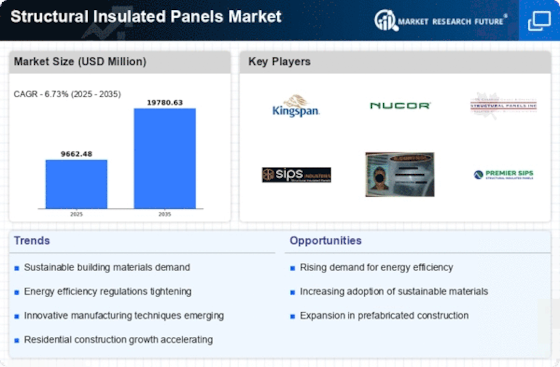Top Industry Leaders in the Structural Insulated Panels Market

The structural insulated panels market is a dynamic and growing sector within the construction industry. These prefabricated panels offer superior insulation, structural strength, and faster construction times compared to traditional framing methods. This has attracted a diverse range of players, making the competitive landscape highly fragmented. Understanding this landscape is crucial for navigating the market and maximizing success.
List of Strategies Adopted by Key Players:
Product Differentiation: Leading players differentiate themselves through innovative panel designs, specialized materials, and high-performance insulation options. For instance, Kingspan offers a wide range of structural insulated panels with varying R-values and fire-resistant core materials.
Geographical Expansion: Companies are actively expanding their reach into new markets, particularly in developing economies with rising construction activity. This includes establishing manufacturing facilities and distribution networks in strategic locations.
Focus on Sustainability: Sustainability is becoming a key differentiator, with players focusing on eco-friendly materials, energy-efficient production processes, and carbon footprint reduction. Metecno, for example, utilizes recycled materials in their structural insulated panels and offers carbon-neutral construction solutions.
Vertical Integration: Some major players are pursuing vertical integration by acquiring raw material suppliers or downstream construction companies. This allows them to better control costs, quality, and delivery timelines.
Partnerships and Collaborations: Strategic partnerships with architects, builders, and developers are crucial for gaining market access and promoting SIPs as a preferred construction method. NCI Building Systems partners with educational institutions to offer training programs on structural insulated panels construction.
Factors for Market Share:
Product Quality and Performance: Superior insulation, strength, and durability of SIPs compared to traditional methods are key drivers of market share.
Cost-Effectiveness: Despite higher upfront costs, SIPs can offer significant long-term savings due to reduced energy consumption and faster construction times.
Brand Reputation and Customer Service: Established brands with strong customer support and a track record of successful projects attract more customers.
Innovation and Technology Adoption: Companies investing in new technologies and innovative structural insulated panels designs gain a competitive edge.
Geographical Presence and Distribution Network: Extensive distribution networks and accessibility in key markets significantly impact market share.
List of the Key Companies in the structural insulated panels market include
- Alubel SpA (Italy)
- PFB Corporation (Canada)
- Owens Corning (US)
- ArcelorMittal (Luxembourg)
- BALEX-METAL (Poland)
- Isopan (Manni Group SpA)
- Italpannelli SRL (Italy)
- Kingspan Group (Ireland)
- Marcegaglia SpA (Italy)
- Metecno (Italy)
- NCI Building Systems (US)
Recent Developments:
September 2023: Kingspan, a leading SIPs manufacturer, launches its OPTIM-R insulated panel with a new, bio-based core material. This innovation aims to reduce the environmental impact of the product.
November 2023: NCI Building Systems announces a partnership with a major homebuilder to use structural insulated panels in a new housing development.
December 2023: The Structural Insulated Panel Association (SIPA) hosts its annual conference, focusing on the latest advancements and trends in the Structural Insulated Panels industry.










